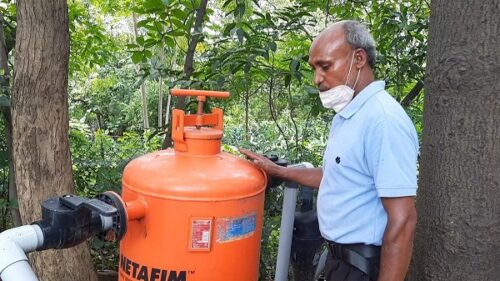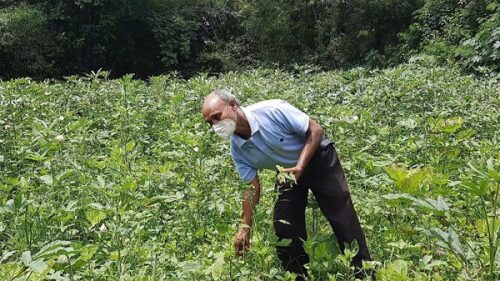Over the decades, massive mining activities in Jharkhand’s Dhanbad district, one of the largest coal producers of India, have led to degradation of agricultural lands due to air and water pollution. In fact, the adverse effects are such that environmentally sensitive materials like iron, bismuth, aluminium, manganese and others are now being found in farmlands.
Uma Mahato, a water operator at a private firm, was no stranger to this issue. His 2-acre ancestral land in Tata Sijua was reeling under the effects of massive erosion. Over the years, the land had degraded due to pollution, and the dumping of coal and discarded stones from the nearby mines had left it barren.
In a conversation with The Better India, Uma recalls the time where this very land was a lush and green paradise, where his father grew pulses and cereals. His memories of the crops swaying in the wind remained in his mind even after he had grown old and followed a career in the non-agricultural sector.
Working to restore his ancestral land’s former glory, Uma toiled for 15 long years to make the soil fertile. He narrates the tale of how he achieved this feat, which is now earning him an additional income of lakhs.
15 years of penance
“Over time, as the yield decreased my parents discontinued farming. Eventually, we could only take one crop for cultivation a year. Later, the waste material from the coal mines started piling up and made the agricultural land infertile. My parents took labour work for sustenance,” he says.
Uma adds that his journey to revive the land began in 1989. “There were days when we had excess daily wagers who needed work. Hence, I decided to employ them at the farm to remove the waste material at Rs 120 a day,” he adds.
He says that at times, he himself would assist the labourers after completing his office hours. “I spent the first five years clearing the waste. The land had to be levelled and prepared for farming. Slowly, I started growing vegetables on small patches to test the productivity,” he adds.
The 51-year-old says that as he gained confidence about the improvement of the soil’s health, he introduced mechanical equipment to increase the quality of the land. “In 1999, I bought a tiller, leveller, reaper and weeder using government subsidies to turn the soil and expose fertile layers from lower layers,” he explains.
Uma says that initially, he used chemical fertilisers to grow vegetables and eventually moved to use organic methods for farming.
Sharing his hardships during the journey, Uma says that the first ten years failed to reap profits, and only added to his expenses. “I spent from my savings at times, but I was determined to restore the land to its original state. Farming is our family profession, and I did not want to let it die,” he says, adding that as the fertility improved, he started growing rice, wheat and seasonal vegetables.
However, as agriculture production increased, Uma now faced issues in irrigating the land due to water scarcity. “In 2003, I installed a drip irrigation system, diesel-powered pump to extract groundwater, and implemented other technological interventions,” he adds.

Uma says that implementing progressive practices on his farm saved him water, production cost and time to conduct farming activities.
He adds that wild boars, dogs and other animals often damaged his crops, and he had to create a boundary to protect his labour. “After I increased protection around the farm, the profits increased as well,” he notes.
‘Never give up on farming’
At present, Uma grows okra, chillies, watermelon, corn, tomato and bitter gourd apart from cereals and pulses, which earns him Rs 3 lakh a year.

He plans to install solar water pumps by seeking government subsidies to reduce his dependency on diesel and electricity. “This will help reduce the production cost further,” he explains.
Uma says that many farmers have given up cultivation in the region due to the prevailing issues from coal mines. However, he says his success has inspired some to incorporate modern techniques and carry on the practice.
Uma notes that sincere efforts and patience can bring success. “I appeal to farmers to not give up their lands or farming activities and allow it to become barren or sell for commercial reasons. Agricultural land will never yield losses if due care is taken, and a farmer will always have a stable source of income,” he adds.
Edited by Divya Sethu
No comments:
Post a Comment